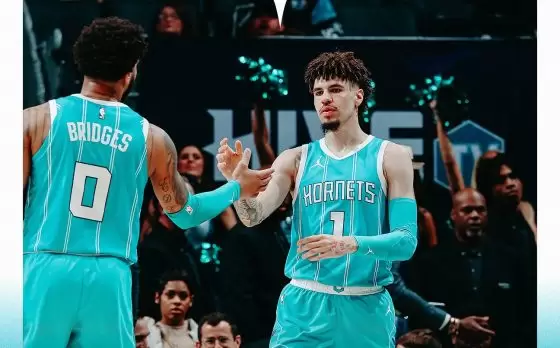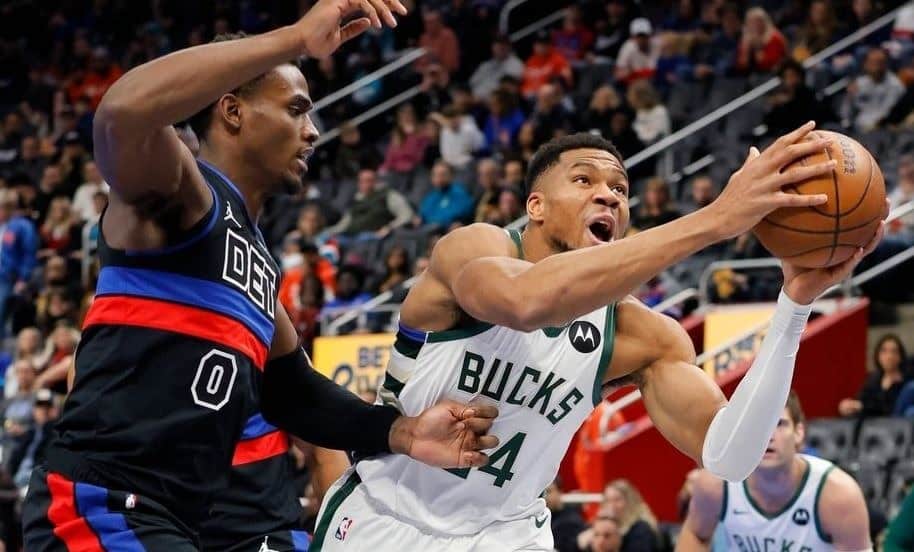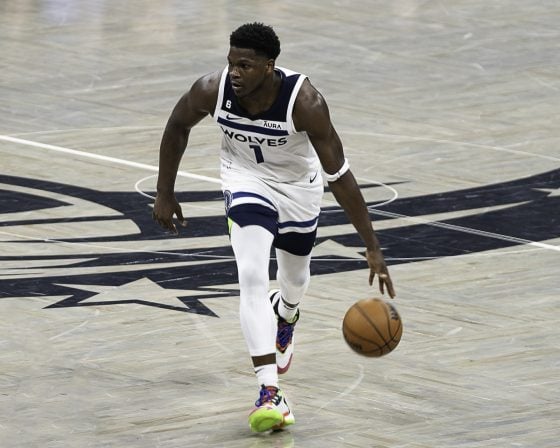1. For the first time in over three months, the Boston Celtics aren’t at least tied for first place in the Eastern Conference. Well, actually, they are. It’s sort of complicated.
With Boston’s loss at the New York Knicks, the Milwaukee Bucks have moved past the Celtics in terms of win percentage. That sees Boston without the NBA’s best record and in second place in the conference for the first time since the fall.
Now, it’s quibbling a bit, because only .007 separates the Celtics and the Bucks in winning percentage. But the main takeaway is that Boston has work to do. They aren’t going to coast to the top seed in the playoffs. That was probably never going to happen.
That said, this wasn’t some disaster loss. The Knicks are good. They’ve been good for a couple of months now. Once New York stopped throwing away games in the final five minutes, their season turned around.
The Celtics lost and they’re no longer atop the East. But the season didn’t end on Monday night, no matter how many people are acting like it did.
We’re going to do something a little different here. There are no clips today, because does anyone really need to see the Celtics miss a ton of open three-pointers again? There are reasons Boston lost and there are definitely not reasons Boston lost. We’re going to break them down, in attempt to paint a more reasonable picture of the game with a benefit of several hours later and a full re-watch.
Not Reasons Boston Lost
1. The officials.
Let’s get this one out of the way first, since it’s bound to be the most unpopular one of the bunch. The Celtics didn’t lose because of the refs.
Yes, fouls were 22-11. Yes, New York outshot Boston 34-14 in free throw attempts. And, yes, there were even some bad calls.
But having watched the game twice, the Knicks were the aggressors. From the jump, New York was focused on getting in the lane to create scoring opportunities. Boston was content to pass around the perimeter and take three-pointers.
In the first quarter alone, where the tone for the game was set, the Celtics took 12 three-pointers (making just one, but more on that later) and just seven shots in the paint.
The Knicks took only six three-pointers and took 13 shots in the paint, including eight directly at the rim.
:no_upscale()/cdn.vox-cdn.com/uploads/chorus_asset/file/24466977/Q1_NYK_shot_chart_vs_BOS.png)
That’s basically a completely opposite shot chart. The Knicks, led by Jalen Brunson and Julius Randle, also repeatedly drove to the basket (more on that later too!). For the entire game, New York had almost twice as many drives as Boston did. Things balanced out a bit, as far as the shot profile went, but for the game as a whole, the Celtics took a lot of spot-up and pullup jumpers, while the Knicks hunted for contact.
One last thing: There is no bias against the Celtics from the officials, as far too many Celtics fans suggested across all forms of social media. Through a quarter of the season, Boston allows the fewest free throw attempts per game in the league. They are tied for 23rd in fouls committed per game. Even adjusting for the Celtics relatively slow pace, Boston is 28th in the NBA in opponent’s free throw attempts.
It’s frustrating because the game before this one for Boston was at the Philadelphia 76ers. The Sixers draw a lot of fouls, and the Celtics play into that with their strategy of making Joel Embiid earn points at the line vs giving up easy layups and dunks.
That means in consecutive games, Boston was on the other side of a wide free throw disparity. The 76ers game was, in part, by design. The Knicks game just sort of happened, because New York willed it to happen and the Celtics let them. But nothing suggests that’s there any kind of bias or conspiracy. If anything, the numbers seem to point in the other direction.
Also, blaming the officials for every loss is tiresome and ridiculous behavior. It’s also incredibly hypocritical to laugh at the Los Angeles Lakers for it, and then turning around and mimicking that exact behavior a few weeks later.
2. The effort.
It’s pretty easy to see when Boston is playing with little effort or low energy. This wasn’t that. They just weren’t playing well. On the nights when the effort is bad, the opponent gets a lot of open and wide-open shots. Or the Celtics get crushed on the glass. Neither of those things happened.
The Celtics had some breakdowns defensively and offensively they couldn’t make a jumper to save their lives. But the effort was fine. It was just a night of bad play.
3. Jayson Tatum the basketball player.
Tatum turned in another very good all-around game. He had nine assists (against four turnovers, which isn’t bad) and seven rebounds. Tatum’s individual defense was also pretty good against both Julius Randle (on switches) and RJ Barrett (on straight-up plays).
The place where Tatum fell short was as a scorer, but we’ll get to that next.
Reasons Boston lost
1. Jayson Tatum the scorer.
Tatum has struggled since the All-Star break. He’s shot 36.7% from the floor and just 24.1% from behind the arc in the three games since the break. That poor shooting has seen Tatum drop to 21 points per game over those three games, which is down from his season average of 30.1 points.
It’s a slump and a really rough one. It’s not all that different from the three-game stretch in mid-November where Tatum shot even worse from the field.
On the plus side, Tatum can now impact games when his shot isn’t falling. But Boston needs his shot to fall. Especially in games when Jaylen Brown isn’t playing. The Celtics aren’t a super heliocentric team like some others are, but they need their star to figure it out. It’s too hard to win otherwise.
The good news? History tells us that after these slumps, Tatum tends to go on a hot streak where he can’t miss for weeks.
2. The shooting.
It was more than just Jayson Tatum having an off night from the outside. Boston hit only 21.4% of their three-pointers. That didn’t stop them from taking half of their shots from behind the arc. But the process to get those shots was great. They aren’t looks you really want guys passing up. It’s not like Rob Williams suddenly started launching threes off the dribble or something. These were good shooters, missing good shots.
Here’s the real killer: Boston generated 16 open three-pointers and 19 wide-open three-pointers. That’s great!
Boston made a total of eight of those 35 shots. That’s not so great!
Tatum was 1-for-9. Marcus Smart was 2-for-7. Derrick White was 0-for-5. Sam Hauser was 0-for-3. Even Malcolm Brogdon was a touch under his usual shooting at 2-for-5.
It’s a cliché to say it’s a “make or miss league”, but it’s also true. Boston got good looks for good shooters. They just didn’t make them.
3. Perimeter defense
This one is easy, so we’ll keep it simple. The Celtics allowed the Knicks ballhandlers to get where they wanted all night long. Jalen Brunson did it with craft and guile. Julius Randle did it by bullying his way to his spots. Immanuel Quickley did it by honor his name with his quickness. RJ Barrett was particular effective, but he slithered through defenders to set up good shots too.
Some of that is going to happen. Brunson and Randle are All-Star level guys. Getting to their spots is what they do. But the Celtics made it way too easy on them for most of the night.
It’s no real surprise that the handful of times Boston made a run, it came on the back of getting stops. And those stops came from bogging down the Knicks offense by pressuring the ballhandlers.
The Celtics defense is very good, so we’ll chalk this up to an off night on that end of the floor too. But it’s something to keep an eye on, as the teams Boston will need to beat in the postseason all have good on-ball creators.
4. Rotations.
Mike Muscala got immediately thrown into the fire without so much as a practice with the Celtics. He played 15, 17 and 44 minutes in his first three games with Boston. After that marathon run in that weird game in Milwaukee, Muscala was inactive for the final game before the All-Star break. Then he was a DNP-CD in the first two games out of the break.
On Monday, it seemed like Joe Mazzulla only went to Muscala as a change-up after Blake Griffin was ineffective in the first half. Given how effective Muscala was in the first few games with Boston, it’s odd that he’s not played much since.
Beyond that, Mazzulla was clearly searching throughout this game and trying stuff, but he’s becoming overly reliant on Rob Williams. In seven of Williams’ last eight games, he’s played at least 25 minutes. The only exception was again that weird Milwaukee game where Williams came off the bench for reasons that remain unknown.
Williams is good, but he’s best in shorter stints. In most games where Williams pushes, or plays more than, 30 minutes, his effectiveness falls. And it really falls off the next game.
The Celtics have the depth up front to keep Williams around 24 minutes most nights. A big part of that should involve playing Muscala, especially on nights when no one can make a shot.
What’s Next
1. The Celtics will be home in Boston for four of their next five games. The challenge? Four of those five games are against playoff teams in the East (Cleveland at home and on the road, Brooklyn and New York in Boston). And the Portland Trail Blazers are fighting for their postseason lives.
That’s a tough stretch, even if most of the games are in Boston. And it’s imperative that the Celtics make the most of the home games. That run is followed by a six-game road trip that will see Boston travel from Atlanta to Sacramento in an 11-day span.
It’s winning time for the Celtics. Their cushion atop the Eastern Conference is gone. Things are far from dire, but if Boston doesn’t want to go to Milwaukee for a Game 7 this spring, they need to take care of their own business of the season’s last 40 days.






